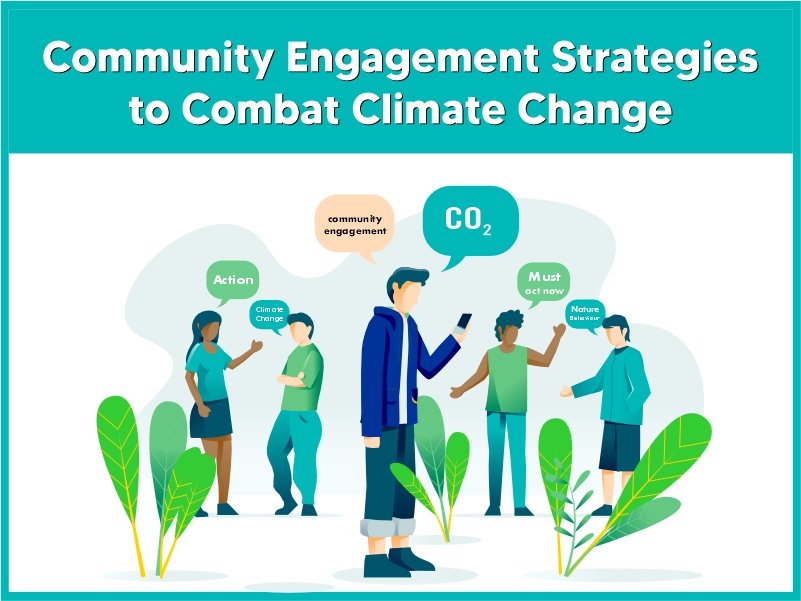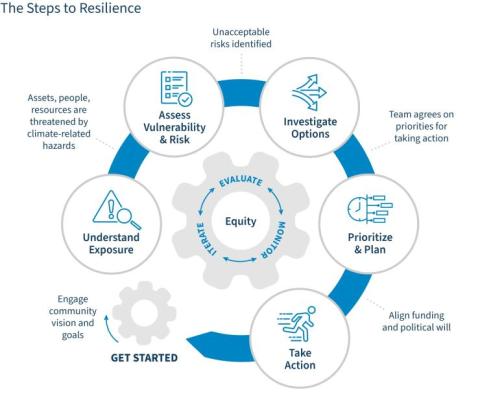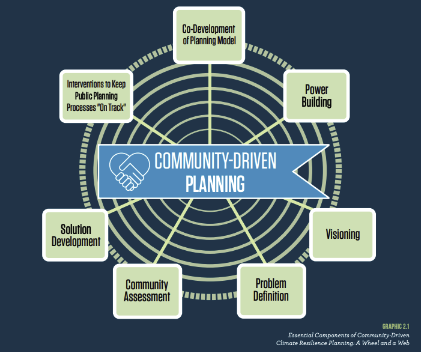How community workshops foster climate resilience strategies locally

As the world grapples with the escalating impacts of climate change, communities worldwide are devising innovative strategies to build resilience. Community workshops have emerged as a crucial platform for fostering climate resilience locally. By bringing together diverse stakeholders, including residents, policymakers, and experts, these workshops facilitate the co-creation of tailored solutions to address the unique climate-related challenges faced by each community. Through interactive discussions, knowledge sharing, and collaborative problem-solving, community workshops empower local communities to take ownership of their climate resilience, enhancing their ability to adapt to and thrive in a changing climate.
- Empowering Local Communities through Climate Resilience Workshops
-
Building Local Climate Resilience through Community-Led Workshops and Strategic Planning Initiatives
- 'Building climate resilience through community initiatives'
- Understanding Community-Led Climate Initiatives
- Key Strategies for Building Climate Resilience
- Scaling Up Community-Led Climate Initiatives
- Building Local Climate Resilience: Effective Community Strategies
- Understanding Local Vulnerabilities
- Enhancing Community Engagement and Awareness
- Implementing Adaptive Measures
- 'What local strategies can enhance community resilience to extreme weather events?'
- Building Infrastructure Resilience
- Promoting Community Awareness and Education
- Fostering Community Engagement and Partnerships
- 'How can local communities develop effective climate resilience through community-driven initiatives?'
- Building Community Capacity
- Identifying and Prioritizing Climate Risks
- Implementing Climate-Resilient Solutions
-
Frequently Asked Questions
- What are community workshops and how do they contribute to climate resilience?
- How do community workshops facilitate the development of local climate resilience strategies?
- What are the key benefits of community-led climate resilience initiatives?
- Can community workshops be effective in diverse geographical contexts?
Empowering Local Communities through Climate Resilience Workshops
Community workshops play a vital role in fostering climate resilience strategies locally by bringing together stakeholders, experts, and community members to share knowledge, experiences, and best practices. These workshops provide a platform for collaborative learning and capacity building, enabling communities to develop effective strategies to mitigate the impacts of climate change.
Identifying Local Climate Risks and Vulnerabilities
Community workshops help identify local climate-related risks and vulnerabilities, which is crucial for developing targeted resilience strategies. By engaging with local stakeholders, workshops can gather valuable insights into the community's specific needs and concerns, allowing for the development of context-specific and effective adaptation measures. This process enables communities to prioritize their efforts and focus on the most critical areas that require attention.
Developing Climate-Resilient Infrastructure and Practices
Workshops can facilitate the sharing of knowledge and expertise on climate-resilient infrastructure and sustainable practices, such as green building designs, early warning systems, and climate-smart agriculture. By adopting these measures, communities can reduce their exposure to climate-related hazards and improve their overall resilience. For instance, a workshop might feature expert presentations on flood-resistant construction or drought-tolerant crops, followed by group discussions on how to implement these solutions locally.
Building Community Engagement and Ownership
Community workshops foster a sense of ownership and engagement among local stakeholders, which is essential for the successful implementation of climate resilience strategies. By involving community members in the decision-making process, workshops can ensure that local needs and concerns are taken into account, and that the developed strategies are socially acceptable and culturally relevant. This participatory approach helps build trust and promotes the adoption of climate resilience measures among community members.
| Workshop Benefits | Description |
|---|---|
| Collaborative Learning | Sharing knowledge and experiences among stakeholders, experts, and community members |
| Capacity Building | Enhancing local capacity to develop and implement climate resilience strategies |
| Context-Specific Solutions | Developing adaptation measures tailored to the community's specific needs and concerns |
Building Local Climate Resilience through Community-Led Workshops and Strategic Planning Initiatives
'Building climate resilience through community initiatives'

Building climate resilience through community initiatives is a vital approach to mitigating the impacts of climate change. Community-led initiatives can play a crucial role in enhancing the capacity of local populations to adapt to climate-related stresses and shocks. By empowering communities to take ownership of their climate resilience efforts, these initiatives can foster a sense of self-reliance and cooperation among community members.
Understanding Community-Led Climate Initiatives
Community-led climate initiatives are programs or projects that are designed, implemented, and managed by local communities. These initiatives often focus on addressing specific climate-related challenges faced by the community, such as droughts, floods, or heatwaves. By understanding the local context and the specific needs of the community, these initiatives can develop targeted strategies to enhance climate resilience.
- Conducting vulnerability assessments to identify areas of high risk
- Developing early warning systems to alert communities of impending climate-related hazards
- Implementing climate-resilient infrastructure, such as sea walls or green roofs
Key Strategies for Building Climate Resilience
Effective community-led climate initiatives employ a range of strategies to build climate resilience. These may include climate-smart agriculture practices, such as agroforestry or conservation agriculture, which can help to enhance soil health and reduce the risk of crop failure. Other strategies may involve the restoration of natural ecosystems, such as mangroves or wetlands, which can provide important ecosystem services and help to mitigate the impacts of climate-related disasters.
- Promoting climate-resilient water management practices, such as rainwater harvesting
- Supporting climate-resilient livelihoods, such as climate-resilient agriculture or sustainable fishing practices
- Fostering community engagement and participation in climate decision-making processes
Scaling Up Community-Led Climate Initiatives
To maximize their impact, community-led climate initiatives need to be scaled up and replicated in other locations. This can be achieved through a range of mechanisms, including knowledge sharing and capacity building, policy and advocacy efforts, and the mobilization of financial resources. By scaling up community-led climate initiatives, it is possible to enhance climate resilience at the local, national, and global levels.
- Developing knowledge products, such as toolkits or guidelines, to support the replication of successful initiatives
- Providing training and capacity-building programs for community leaders and local organizations
- Advocating for policies and programs that support community-led climate initiatives
Building Local Climate Resilience: Effective Community Strategies

Building local climate resilience is an essential step towards mitigating the impacts of climate change on communities worldwide. Effective community strategies are crucial in enhancing the ability of local populations to withstand and recover from climate-related disasters. This involves a multi-faceted approach that includes understanding local vulnerabilities, enhancing community engagement, and implementing adaptive measures tailored to the specific needs and conditions of each locality.
Understanding Local Vulnerabilities
Understanding the specific vulnerabilities of a local community is foundational to building climate resilience. This involves conducting thorough risk assessments to identify areas and populations most susceptible to climate-related hazards such as flooding, droughts, or heatwaves. By understanding these vulnerabilities, communities can prioritize their efforts and resources more effectively.
- Conduct detailed climate risk assessments to identify vulnerable areas and populations.
- Engage with local stakeholders to gather insights into historical climate-related events and their impacts.
- Develop vulnerability maps to visualize and communicate risk areas effectively.
Enhancing Community Engagement and Awareness
Community engagement is a critical component of building climate resilience. By raising awareness and involving local populations in the planning and decision-making process, communities can foster a sense of ownership and ensure that resilience-building efforts are tailored to local needs. Effective engagement strategies can include public education campaigns, community workshops, and participatory planning processes.
- Implement public education campaigns to raise awareness about climate change impacts and resilience measures.
- Organize community workshops and training sessions to build capacity and involve local populations in planning.
- Foster partnerships with local organizations and leaders to enhance outreach and credibility.
Implementing Adaptive Measures
Implementing adaptive measures is crucial for enhancing the resilience of local communities. These measures can range from infrastructure improvements, such as sea walls or green roofs, to ecosystem-based adaptations, like restoring wetlands or enhancing biodiversity. The choice of measures depends on the specific vulnerabilities and context of each community.
- Invest in infrastructure improvements that are resilient to projected climate changes.
- Promote ecosystem-based adaptation by restoring natural ecosystems that provide protective services.
- Support climate-resilient agriculture practices to enhance food security.
'What local strategies can enhance community resilience to extreme weather events?'

Enhancing community resilience to extreme weather events requires a multi-faceted approach that involves various local strategies. Communities can take proactive measures to reduce the risks associated with extreme weather events such as floods, droughts, and heatwaves. Effective local strategies can be developed by understanding the specific needs and vulnerabilities of the community.
Building Infrastructure Resilience
Building infrastructure resilience is crucial to withstanding extreme weather events. This involves designing and constructing buildings, roads, and other critical infrastructure to withstand the impacts of extreme weather.
- Implementing flood-resistant construction techniques and materials
- Elevating critical infrastructure above flood-prone areas
- Using green infrastructure to manage stormwater runoff
Promoting Community Awareness and Education
Community awareness and education are vital components of enhancing resilience to extreme weather events. By educating residents on the risks associated with extreme weather and the steps they can take to prepare, communities can reduce the impacts of these events.
- Conducting regular emergency preparedness drills and training exercises
- Providing information on evacuation routes and emergency shelters
- Promoting the use of early warning systems for extreme weather events
Fostering Community Engagement and Partnerships
Fostering community engagement and partnerships is essential for developing effective local strategies to enhance resilience. By engaging with residents, businesses, and other stakeholders, communities can develop a collaborative approach to addressing the impacts of extreme weather events.
- Establishing community emergency response teams
- Partnering with local organizations to provide support services
- Collaborating with neighboring communities to share resources and expertise
'How can local communities develop effective climate resilience through community-driven initiatives?'

Local communities can develop effective climate resilience through community-driven initiatives by taking ownership of their climate adaptation and mitigation efforts. This can be achieved by understanding their unique vulnerabilities and assets, and developing tailored strategies that leverage local knowledge and resources. Community-driven initiatives can be more effective because they are grounded in the specific needs and contexts of the community, and are more likely to be implemented and sustained over time.
Building Community Capacity
Building community capacity is a crucial step in developing effective climate resilience. This involves enhancing the skills, knowledge, and resources available to community members, so they can effectively respond to and manage climate-related risks.
- Training and education programs can be implemented to enhance community members' understanding of climate change impacts and adaptation strategies.
- Community-based organizations and local governments can be strengthened to support climate resilience efforts.
- Partnerships can be established with external organizations to access additional resources and expertise.
Identifying and Prioritizing Climate Risks
Identifying and prioritizing climate risks is essential for developing effective climate resilience. This involves understanding the potential impacts of climate change on the community, and identifying areas that are most vulnerable.
- Conducting climate risk assessments can help identify potential climate-related hazards and vulnerabilities.
- Community members can be engaged in the risk assessment process to ensure that their concerns and priorities are taken into account.
- Prioritizing climate risks can help focus efforts on the most critical areas, and ensure that resources are allocated effectively.
Implementing Climate-Resilient Solutions
Implementing climate-resilient solutions is a key step in developing effective climate resilience. This involves developing and implementing strategies that reduce the community's vulnerability to climate-related risks.
- Climate-resilient infrastructure can be developed to protect community assets and infrastructure from climate-related hazards.
- Climate-smart agriculture practices can be implemented to enhance food security and reduce the impacts of climate change on agriculture.
- Ecosystem-based adaptation strategies can be used to restore and enhance natural ecosystems that provide important ecosystem services and help to build resilience.
Frequently Asked Questions
What are community workshops and how do they contribute to climate resilience?
Community workshops are local gatherings that bring people together to discuss and develop strategies for addressing climate-related challenges. They foster climate resilience by empowering communities to take ownership of their environment and develop tailored solutions. By sharing knowledge and experiences, participants can identify vulnerabilities and develop effective adaptation plans, enhancing their community's ability to withstand climate impacts.
How do community workshops facilitate the development of local climate resilience strategies?
Community workshops facilitate the development of local climate resilience strategies by providing a platform for stakeholders to collaborate and share insights. Participants engage in interactive discussions, mapping exercises, and scenario planning, enabling them to identify key vulnerabilities and develop targeted interventions. This collaborative approach ensures that strategies are context-specific, effective, and inclusive, addressing the unique needs and concerns of the local community.
What are the key benefits of community-led climate resilience initiatives?
Community-led climate resilience initiatives offer numerous benefits, including enhanced community engagement, improved climate awareness, and increased local ownership. By involving local stakeholders in the decision-making process, these initiatives foster a sense of responsibility and promote the development of context-specific solutions. This approach also ensures that climate resilience strategies are tailored to the community's unique needs, making them more effective and sustainable.
Can community workshops be effective in diverse geographical contexts?
Yes, community workshops can be effective in diverse geographical contexts. By adapting the workshop format and content to the local context, facilitators can engage communities in various settings, from rural to urban areas. The flexible and inclusive nature of community workshops enables them to be applied in different cultural, social, and environmental contexts, making them a valuable tool for promoting climate resilience globally.

Leave a Reply